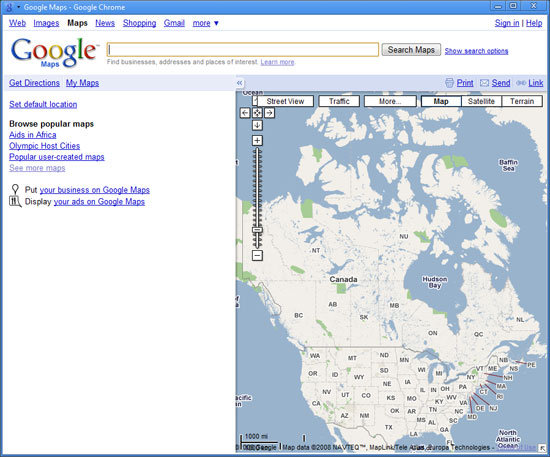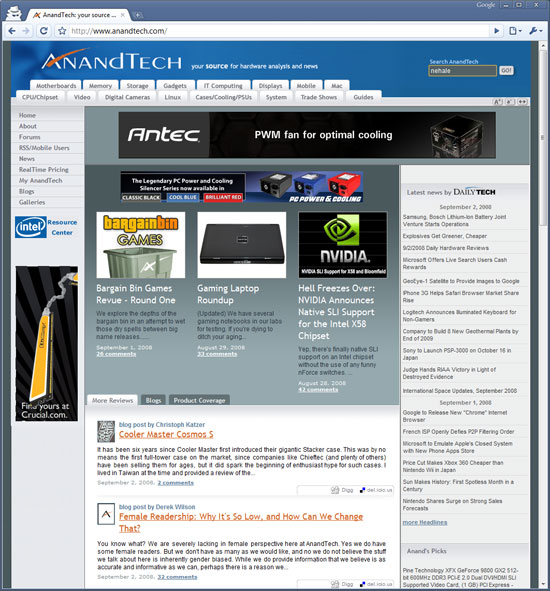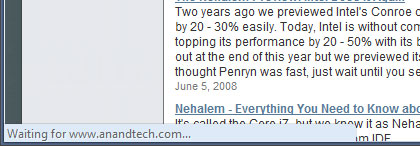Google Chrome: Performance and First Impressions
by Anand Lal Shimpi on September 3, 2008 12:00 AM EST- Posted in
- Software
Google made a...browser?
Based on WebKit, the same foundation for Apple’s Safari web browser - yesterday Google introduced Chrome, it’s own browser:

It’s been a while since we’ve had a brand new, completely unexpected Google launch and what better way to change that than by launching a damn web browser?
![]()
It's getting crowded in the browser market
Despite how often Google is viewed as competing with Microsoft, these days it’s acting very Apple-like. Android has the potential to bring to the masses much of what Apple did with the iPhone, and Apple’s MobileMe (albeit mismanaged and poorly launched) is one step away from being a costly Google Apps competitor. The browser step for Google is an interesting one, yet of all of the browser companies Google is the most natural fit - it’s almost surprising that Google hadn’t released a browser by now.
What follows are my thoughts on Chrome - be sure to chime in with your own in the comments.
Sometimes It Takes a Revolution
Google revamped a few basic things with Chrome, some of them with very deep implications.

Your home page is now a tiled list of your most visited websites. In the old days it used to be one site or one search engine, but now with sites like YouTube, Facebook, AnandTech (see how I snuck that one in there?), MySpace, Digg, etc... it’s tough to have just one single home page. Google’s change here makes sense and it is also quite altruistic. Google could’ve just as easily used its own browser platform to help promote its own websites and services.
If you’ve only got IE7 installed on your machine Chrome will even default to Microsoft’s Live Search as the default search engine, asking you if you’d like to change it. The assumption is that your computer is setup the way you want it to be and Google isn’t going to force its services on you - competition is best done based on merit, not by manipulating the market.

You can add direct links to web applications on your desktop, which will fire up Chrome in more of a thick-client view like this
The most visible change is that the tabs are now the topmost part of the browser window, in fact there’s no menu bar at all. Accessing typical menu items is done via two very simple buttons at the right of the OmniBar (what Google’s developers call the URL bar). There’s not even a menu item for opening a file/web page, although CTRL + O will bring up an open dialog box.
Removing the menu bar does something very interesting for Google Chrome: it makes it look very OS agnostic. It doesn’t quite fit in with Vista’s look and feel, nor does it look very Apple at all. In Google’s world, the OS doesn’t matter, so long as it has access to the Internet (see: Google docs, YouTube, Gmail, etc...). Given this view of the world, why should Chrome have an archaic remnant of conventional OSes? The missing menu bar is a very important statement.
There’s no search box in Chrome (not even a Google Search box), all searching/navigating is done through the OmniBar. Much like Spotlight under OS X, you get full text search through any webpage in your history. Remember reading something about panda bears a couple of days ago but can’t remember what site it was on? Just type in panda bears into the OmniBar and you’ll get a list of relevant results from your history.

Sites like Amazon can be searched from within the OmniBar as well, assuming you’ve performed a search on the site before. Just start typing Amazon into the OmniBar and hit tab to type in your search query. It’ll take you straight to the search results on Amazon.com. Pretty cool.
Incognito mode
Private browsing is taken the next level by Chrome with its incognito mode. You can choose to open an individual window/tab in incognito mode, where no data is logged and nothing is added to your history. You even get a cool guy wearing a trench coat in the upper left hand corner of your incognito window to drive the feature home.

Downloads & History
Downloads are handled quite elegantly in Chrome, when something starts downloading it appears as an icon at the bottom of your browser window. There’s no external download manager window. I’m not sure if this is the most efficient approach, especially when managing tons of downloads, but I suspect that it works well for most users.

Downloads appear at the bottom of your browser

The status bar only appears when appropriate, otherwise it disappears - even when visible it only takes up as much space as it needs.
History is organized like a simple web page, it just makes sense:











105 Comments
View All Comments
kiroset - Wednesday, September 3, 2008 - link
Looks like they copied the popular Firefox extension - Download Statusbar - I think I prefer that implementationhttps://addons.mozilla.org/en-US/firefox/addon/26">https://addons.mozilla.org/en-US/firefox/addon/26
MagicalMule - Wednesday, September 3, 2008 - link
Maybe this has been said before, but I don't feel like reading three pages of comments.Where's the Opera love? It had some of these feature's, is very fast, scores highest on the Acid3 test, and was not even mentioned?
Furthermore, I am a bit weary of anything "Google" these day's thanks to their dubious privacy practices. I can't live without Gmail, and Google as a search engine, but if there was a decent alternative that didn't track you online activities/searches the same way google does I would use it for sure. Thanks to that I'm staying away from Google Chrome.
And of course because Firefox is better. =)
Long live Adblock Plus!
Tegeril - Wednesday, September 3, 2008 - link
Opera holds 0.71% of the browser market share. It is essentially a non-player. http://en.wikipedia.org/wiki/Usage_share_of_web_br...">http://en.wikipedia.org/wiki/Usage_share_of_web_br...britz - Wednesday, September 3, 2008 - link
and what kind of argument is that, if that page shows:"It is also possible to underestimate the usage share by using the number of requests, for example:
Many browsers and download managers spoof a different user agent string to the web server to prevent erroneous or malicious browser sniffing which could result in receiving broken or incompatible code, or being completely blocked, and thus increasing the statistics for other browsers (as an example, prior to version 9, the Opera web browser had "Identify as Internet Explorer" as the default user setting)"
Zensen - Wednesday, September 3, 2008 - link
Geez, I was hoping to get a comparison with opera yet here's another article that seems to ignore it. I mean from the testing I did today, the google browser seems fast and simple to use yet It was amazing how many things they did borrow from the opera.I read it regardless but I wasn't impressed that such a powerful and useful browser was overlooked. To those who enjoy safari, to each its own but I just don't bother with that. Having said that google has made me rethink the advantages of webkit and safari underlying structure is based on that too so I can see the similarities but as ridiculous as the logo and name is, I'd definitely choose chrome over safari even at this beta stage - both react the same way but chrome seems faster and at boot up its instanteous. It's not a revolutionary step but time will tell if its even worth considering. FF has its advantages but for ease of use and speed opera, hands down. I just don't understand why ignore opera which has its foot in mobile and console platforms.
Hopefully Google will implement some kind of RSS reader which i found quite surprising to be missing (or at least i couldn't find the thing). Loving the all in one search bar but something sorely missing that I've enjoyed from FF3 and Opera is the URL searching 'word' strings making easier to find the address you're looking for.
single process seems like a nice concept and it seems to leave a smaller footprint so thats always a good thing? better power saving? I'll have to test this out further before I comment further.
History searching is clean and useful and speed dial-esque similar to opera is a fantastic use of new tab space :)
Dev tools is a great start, similar to what i saw on safari but safari's view source sucks compared to this but FF and opera still have it hands down on dev tools that come along with it.
I haven't tested their downloading capabilities but unlike the other browsers opera comes in built with torrent capabilities so I'll have to look further into it.
For a simple clean browser without the geeky factor, it'll probably entice quite a few casual users - Google after all... is google and that thing called search, well you'll be hard pressed to not see people intrigued by it when they come across their site.
<3 Opera. Bring on innovation!
silhrt - Wednesday, September 3, 2008 - link
Currently, i can't even get it to work.Noone here at where i work can get it to work.
Does anyone have a link to where i can get in touch with them about why?
MorphiusFaydal - Wednesday, September 3, 2008 - link
Personally, I'm going to wait to try it out until I can get AdBlock and something similar to Foxmarks. And addon like ForecastFox would be nice too. :)Ryan Smith - Wednesday, September 3, 2008 - link
Unlike the boss, I'm a bit more leery of Chrome myself, both in the sense that I'm not entirely excited, and in the sense that there are some things that worry me.I'm not excited in the sense that it is and it isn't a new browser; it's Safari's WebKit at the core. It's going to render a lot of stuff just like Safari and just as fast as Safari. I happen to like Safari (on the iPhone at least) so this isn't a bad thing, but it also means that Chrome is definitely evolutionary and not revolutionary in the end. For that matter I'm not entirely sure where to put things in a historical context, since normally new browsers are on new rendering engines. Firefox is probably the closest parallel, but even then it was a massive gutting of Mozilla.
As for the things that worry me:
1) I'd really like to see a good in-depth examination of the EULA and the code, to see what goes back to Google. Google is an ad firm that makes a damn good search engine (among other things) so I'd like to know what information is going where and what it's being used for, so that I'm not being abused in the process. I have no desire to start making Google my overlord.
2) Websites as applications scare me in general, this only furthers that, as Chrome's main purpose is to push performance and stability improvements in browsers to make them more suitable for web apps. Much of this goes with #1 since it involves relinquishing some control, but it's also a matter of bloat and overall system security. This model in essence turns the web browser in to an operating system; this is great for platform independence, but not so great for security. Operating systems are tricky beasts to write and maintain, they're quite often flawed as a result. The browser as an operating system brings many of these issues to the browser. My fear is that we end up with inherently sub-par applications that require a browser every bit as bloated and insecure as Windows is accused of being; it's a situation where there's much to lose and little to gain.
Ultimately "active" content should be handled by the OS, that's what it's there for.
With that said, there are plenty of interesting bits of Chrome that I'm looking forward to other browsers implementing. Record-free browsing, per-tab processes (since it looks like we're not getting rid of Flash any time soon, and Adobe can't seem to make it as stable as the browser it runs in), and faster Javascript performance are all nice things to have. And making all of this available under the BSD license is an excellent way to go, since whatever good things that may come out of Chrome can freely be taken and implemented in other browsers.
Should Chrome ever leave beta (it is Google after all...) it's going to be worth keeping an eye on.
scottrick49 - Wednesday, September 3, 2008 - link
opera has an 83 on the acid3 testcousin333 - Friday, September 5, 2008 - link
Yes (85 with latest weekly). And Chrome has 78 as the screenshot says here. But in the article, it's 74/100..